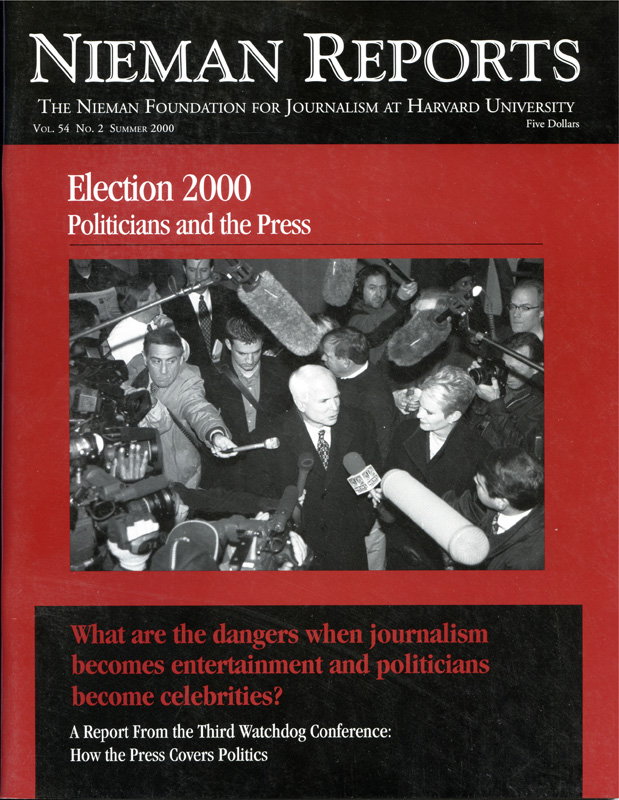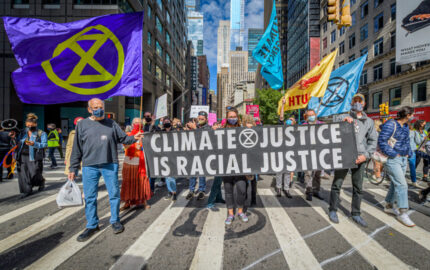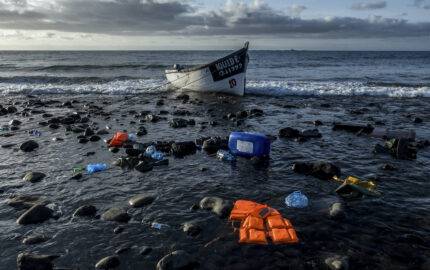Nieman Curator Bill Kovach opened the political Watchdog Journalism conference, held at the National Press Club in Washington, D.C. in October 1999, with cautionary words about press coverage of this election cycle.
“I was just at a conference last week at the Ronald Reagan Library. And several things about that conference sort of crystallized some thoughts in my mind. The program, ‘Can Democracy Survive the Mass Media,’ began with a series of film clips put together by Marty Nolan of The Boston Globe about how Hollywood looks at the press. The scene that most struck me in connection with what we’re thinking about today was a scene from the old movie, ‘The Man Who Shot Liberty Valance.’ It’s the scene at the end when the publisher decides to suppress a major exposé of a major politician by saying, ‘When the legend becomes fact, we’ll just print the legend.’
“The key point of concern at this conference is the impact of the rush toward a more entertaining journalism that is focused on celebrity and examines issues in the context of personality. At that conference there was an acknowledged expert in that field, Steve Coz, Editor in Chief of The National Enquirer. Steve had some interesting things to say about this process of turning politicians into celebrities. ‘We in the press,’ he said, ‘are creating a society in which celebrities influence all areas of life and now reach for political power. When politicians become celebrities, celebrities become politicians. When politics become the playground of celebrity it benefits us at The National Enquirer because we’ve already been through the looking glass.’
“It’s the tendency to focus on the celebrity, the character, not serious character but personality traits of political figures that trivializes the political process. So the focus of this discussion will be on issues which might be overlooked or underreported in the 2000 campaigns. Issues like those that David Broder spoke of last May when he wrote in his column that it’s quite a trick for something to grow larger and at the same time become more invisible. Broder was talking about the health care issue then, but he might just as well have been talking about any one of a number of issues that loom ill-defined in the background of the campaign rhetoric that focuses on youthful indiscretions or political money.”
“I was just at a conference last week at the Ronald Reagan Library. And several things about that conference sort of crystallized some thoughts in my mind. The program, ‘Can Democracy Survive the Mass Media,’ began with a series of film clips put together by Marty Nolan of The Boston Globe about how Hollywood looks at the press. The scene that most struck me in connection with what we’re thinking about today was a scene from the old movie, ‘The Man Who Shot Liberty Valance.’ It’s the scene at the end when the publisher decides to suppress a major exposé of a major politician by saying, ‘When the legend becomes fact, we’ll just print the legend.’
“The key point of concern at this conference is the impact of the rush toward a more entertaining journalism that is focused on celebrity and examines issues in the context of personality. At that conference there was an acknowledged expert in that field, Steve Coz, Editor in Chief of The National Enquirer. Steve had some interesting things to say about this process of turning politicians into celebrities. ‘We in the press,’ he said, ‘are creating a society in which celebrities influence all areas of life and now reach for political power. When politicians become celebrities, celebrities become politicians. When politics become the playground of celebrity it benefits us at The National Enquirer because we’ve already been through the looking glass.’
“It’s the tendency to focus on the celebrity, the character, not serious character but personality traits of political figures that trivializes the political process. So the focus of this discussion will be on issues which might be overlooked or underreported in the 2000 campaigns. Issues like those that David Broder spoke of last May when he wrote in his column that it’s quite a trick for something to grow larger and at the same time become more invisible. Broder was talking about the health care issue then, but he might just as well have been talking about any one of a number of issues that loom ill-defined in the background of the campaign rhetoric that focuses on youthful indiscretions or political money.”



